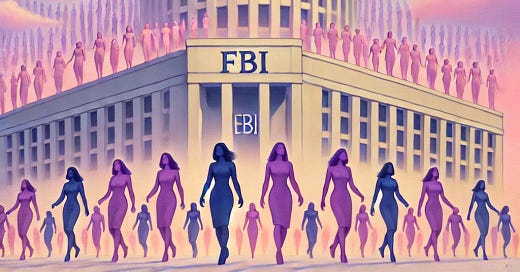FBI Settles $22M Sexual Discrimination Lawsuit
What It Means for Gender Equality and Institutional Reform.
Introduction
The FBI has long been regarded as one of the premier law enforcement agencies in the world. However, a recent class-action lawsuit highlights the gender discrimination and harassment faced by female recruits at the FBI's training academy in Quantico, Virginia. In a significant development, the FBI has agreed to pay over $22 million to settle the case, which involved allegations of a hostile work environment and systemic biases against women. This case not only raises questions about the treatment of female recruits but also shines a light on the broader issue of gender equality within federal law enforcement.
Background of the Case
The lawsuit, filed in 2019, alleged that female recruits were disproportionately targeted for dismissal and subjected to inappropriate comments and actions from male instructors. Claims ranged from sexually charged remarks about breast size to false accusations of infidelity and demands for women to control their moods through contraception. The lawsuit contends that these behaviours were not isolated incidents but part of a pervasive culture that had been allowed to flourish unchecked at the FBI Academy.
Many female recruits found themselves evaluated more harshly than their male peers, leading to dismissal for perceived lack of judgment in tactical situations. This hostile environment, according to the plaintiffs, extended beyond individual misconduct to reflect broader institutional failings.
Settlement Terms
The FBI's decision to settle the lawsuit for $22 million is notable for several reasons. For one, it ranks among the largest lawsuit settlements in the FBI's history. Under the terms of the settlement, the 34 women who were dismissed from the academy will have the opportunity to continue their training and, if they pass, will receive placement in one of their top three preferred field offices. Moreover, the FBI has agreed to bring in external experts to ensure that future evaluations of female recruits are conducted fairly, without gender bias.
These reforms represent a step towards addressing the systemic problems that led to the lawsuit in the first place. However, as lead plaintiff Paula Bird, now a lawyer, remarked, while the settlement offers "a measure of justice," the experience has been disillusioning for many of the women involved. Some have already moved on to other careers, robbing the FBI of potentially exceptional talent.
Broader Implications for the FBI
The FBI's settlement comes at a time when the bureau has faced a number of high-profile sexual misconduct claims, including against senior officials. Some of these officials left the FBI with full benefits despite substantiated allegations of harassment and coercion. The settlement underscores the need for deeper institutional reform within the bureau to address these ongoing issues.
In response to mounting pressure, the FBI has already instituted a series of measures aimed at curbing sexual misconduct, such as a 24/7 tip line for reporting inappropriate behaviour. Nevertheless, the fact that men still comprise about 75% of the FBI's special agents highlights the ongoing challenge of achieving gender parity within the agency.
Conclusion
The $22 million settlement marks a significant moment in the ongoing fight for gender equality within federal law enforcement. While the payout and associated reforms represent progress, the underlying culture that allowed these problems to persist for so long remains a serious concern. Only time will tell whether the FBI's commitment to reform will lead to meaningful change, or if more work is needed to dismantle the "Good Old Boy Network" that many women say has defined the agency for too long.
This case serves as a reminder of the importance of vigilance in confronting institutionalised gender bias and harassment. As one of the world's leading law enforcement agencies, the FBI has an obligation to lead by example. How it navigates this challenge could set the tone for similar organisations grappling with issues of diversity, inclusion, and gender equality.




